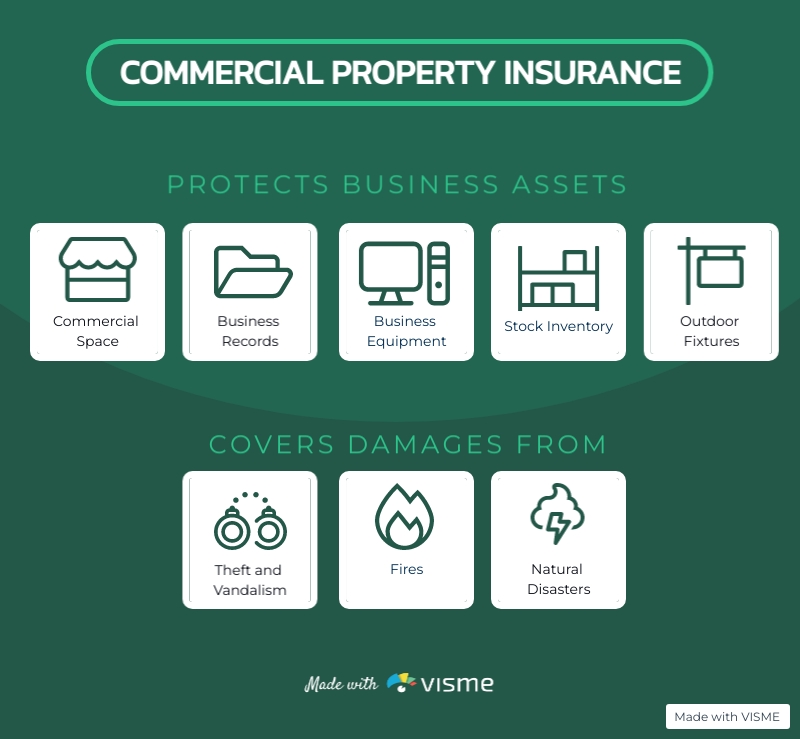Defining Commercial Property Insurance
Commercial or business property insurance is a vital insurance policy for businesses, safeguarding a company’s real estate and onsite physical assets. This coverage protects against unforeseen incidents, including fire, theft, and natural disasters. It’s similar to property insurance, but business owners can deduct their premiums as expenses.
What Does Commercial Property Insurance Cover?

Types of Commercial Property Insurance by Policy
The policy type plays a significant role in determining the scope of coverage for your commercial space and equipment:
- Named Perils Policy: This policy explicitly covers incidents listed in the policy, such as theft and fire. Business owners can tailor coverage based on their unique risk profile.
- Open Perils Policy: Offering broader coverage, an Open Perils Policy protects against a wide range of incidents but comes with a list of exclusions, such as flood damage. While providing more extensive protection, this policy generally costs more.
What Does Commercial Property Insurance NOT Cover?
While commercial property insurance provides robust coverage for various incidents, it’s crucial to note the scenarios that fall outside its scope. This type of insurance does not cover incidents related to tenants using their commercial space and equipment. Expressly, it excludes:
- Company cars getting into an Accident during work hours, which your commercial auto insurance covers,
- Flood damages, which require separate insurance coverage,
- Damages to your client or customer’s property within your commercial space and
- Incidents where you or your employees accidentally or intentionally damage the commercial space and physical assets at work.
Do I Need Commercial Property Insurance?
For business owners with commercial spaces, having an official agreement with the building’s owner is common. This outlines damages for which the business owner is responsible. Commercial property insurance serves as a financial safety net, covering costs instead of requiring out-of-pocket payments for repairs. It becomes crucial during severe cases like natural disasters or significant fires, preventing business closure and mitigating financial burdens. Home business owners should opt for home business insurance instead.
How Much Does Commercial Property Insurance Cost?
The cost of commercial property insurance varies for small businesses, with an average monthly premium of $67, according to Insureon. Notably, 62% of small businesses spend $100 or less for coverage.
Several factors contribute to the cost of commercial property insurance, including:
- Value of Business Assets: The higher the value of physical assets within the commercial property, the higher the replacement value and coverage level, influencing the insurance cost.
- Weather Conditions of the Location: Buildings in areas with a higher risk of weather-related catastrophes may incur higher coverage costs due to increased risk.
- Access to Fire Protection: The presence or absence of fire department services in the vicinity can impact insurance quotes, with higher costs for properties outside city fire protection zones.
- Building Safety Measures: Investing in safety measures like fire alarms and Security systems can lower insurance costs.
- Material of the Building: Buildings constructed with fire-proof materials may qualify for lower rates, but additional combustible structures could negate the reduction of rates.
- Occupancy: The nature of the business in the commercial space also influences premiums. Businesses with a higher risk of incidents, such as restaurants or welding shops, may experience higher premiums.
- Other factors: Payroll size, number of employees, and claims history.
What Coverage Limit Should I Choose per Occurrence?
Choosing the right coverage limit per occurrence is crucial for your specific business needs. Discussing with your insurance agent helps make an informed decision on the necessary coverage amount.
For example, if your business suffers $500, 000 in wind damages but your maximum coverage is $400, 000 per incident, you’ll face a $100, 000 shortfall. Aligning coverage limits with potential risks is key to avoiding unexpected out-of-pocket expenses.
Collaborating with your insurance agent ensures you determine the most suitable coverage limits for financial security in unforeseen incidents.
What is the Commercial Property Insurance’s Standard Deductible?
The standard deductible for a commercial property insurance policy can vary, typically ranging from hundreds to more than a thousand dollars. According to Insureon, the average deductible chosen by their customers is $1, 000.
understanding the standard deductible is crucial as it represents the amount a business owner needs to contribute out of pocket before the insurance coverage takes effect. The higher the deductible you pay, the lower your insurance cost will be.
Types of Commercial Property Insurance
Commercial property insurance comes in different forms, offering varying coverage approaches to meet the diverse needs of businesses. Two primary types include:
- Replacement Cost Coverage: With this type of coverage, the insurance company commits to replacing your commercial property with similar, new items. These items are typically non-tax-deductible.
- Actual Cash Value Coverage: Under this coverage, damaged property is reimbursed based on its fair market value, considering depreciation. While providing coverage for the current property value, it factors in depreciation, influencing the reimbursement amount.
Business Owner’s Policy (BOP)
For small businesses, a Business Owner’s Policy (BOP) is a practical and cost-effective choice. It bundles essential insurance policies, including Commercial Property Insurance, General Liability Insurance, and Business Interruption Insurance, offering comprehensive coverage at an affordable rate. This streamlined approach helps optimize risk management strategies for small businesses.
Commercial Property Insurance for Your Business
Commercial property insurance serves as a crucial safety net for businesses, offering protection in times of emergency, including natural disasters, fire, or theft. This insurance ensures business continuity by covering damages to your commercial space and physical assets, allowing you to Focus on your operations without the financial burden of repairs or replacements.
The costs of commercial property insurance are influenced by various factors, including the value of your business location, the building structure, and the type of business you operate. Click below to learn more.



